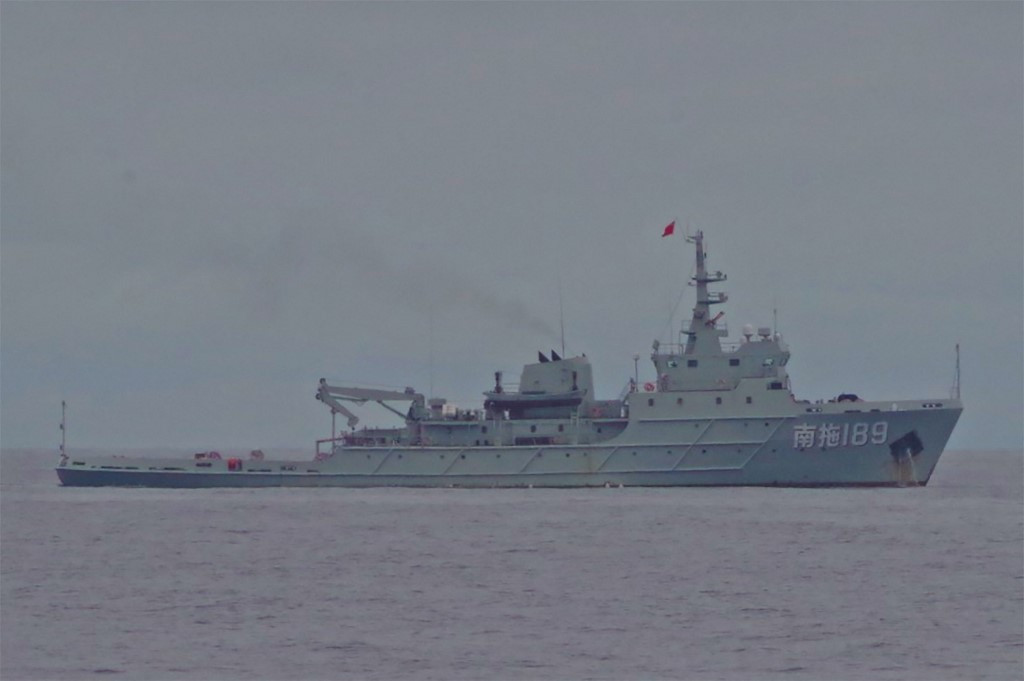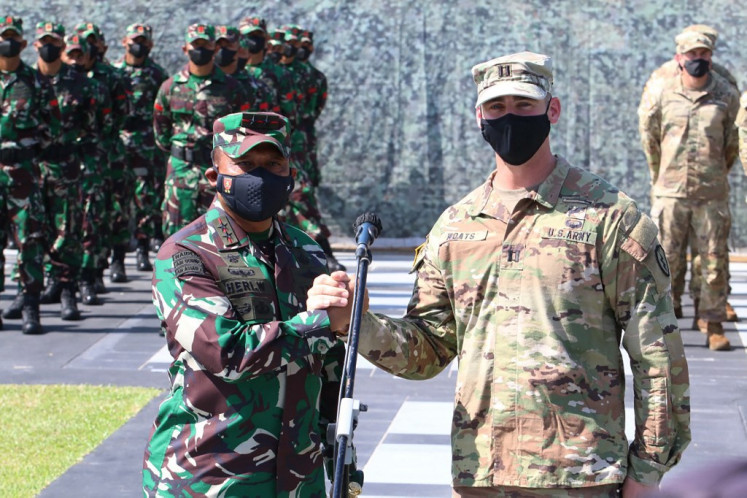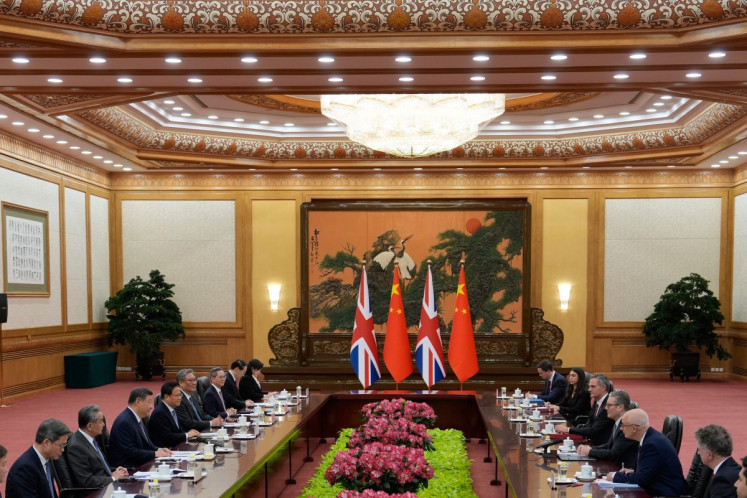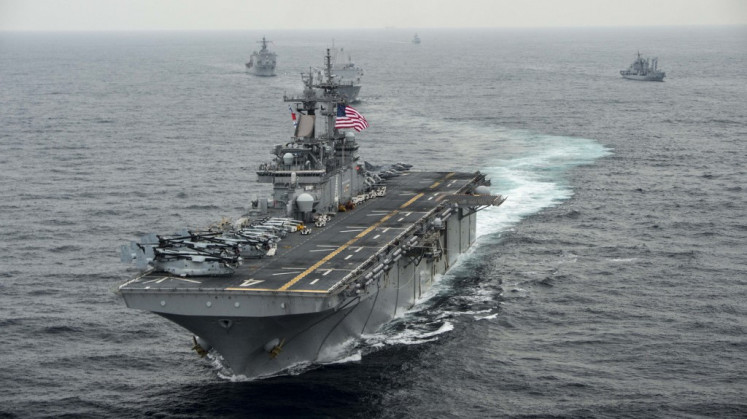Popular Reads
Top Results
Can't find what you're looking for?
View all search resultsPopular Reads
Top Results
Can't find what you're looking for?
View all search resultsChina protested Indonesian drilling, military exercises
The unprecedented demand, which has not previously been reported, elevated tensions over natural resources between the two countries in a volatile area of global strategic and economic importance.
Change text size
Gift Premium Articles
to Anyone
C
hina told Indonesia to stop drilling for oil and natural gas in maritime territory that both countries regard as their own during a months-long standoff in the South China Sea earlier this year, four people familiar with the matter told Reuters.
The unprecedented demand, which has not previously been reported, elevated tensions over natural resources between the two countries in a volatile area of global strategic and economic importance.
One letter from Chinese diplomats to Indonesia's foreign ministry clearly told Indonesia to halt drilling at a temporary offshore rig because it was taking place in Chinese territory, according to Muhammad Farhan, a lawmaker on the House of Representative's national security committee, which was briefed on the letter.
"Our reply was very firm, that we are not going to stop the drilling because it is our sovereign right," Farhan told Reuters.
A spokesman for the Foreign Ministry said: "Any diplomatic communication between states is private in nature and its content cannot be shared." He declined further comment.
China's foreign ministry, defence ministry and embassy in Jakarta did not immediately respond to requests for comment.
Three other people, who said they were briefed on the matter, confirmed the existence of the letter. Two of those people said China made repeated demands that Indonesia stop drilling.
Southeast Asia's biggest nation says the southern end of the South China Sea is its exclusive economic zone under the United Nations Convention on the Law of the Sea and named the area as the North Natuna Sea in 2017.
China objected to the name change and insists the waterway is within its expansive territorial claim in the South China Sea that it marks with a U-shaped "nine-dash line," a boundary found to have no legal basis by the Permanent Court of Arbitration in the Hague in 2016.
"It (the letter) was a bit threatening because it was the first effort of China's diplomats to push their nine-dash line agenda against our rights under the Law of the Sea," Farhan told Reuters.
China is Indonesia's biggest trade partner and second-largest source of investment, making it a key part of Indonesia's ambition to become a top-tier economy. Indonesian leaders kept quiet about the matter in order to avoid conflict or a diplomatic spat with China, Farhan and two of the other people who spoke to Reuters said.
This handout photo taken on August 4, 2021 and released by the Indonesia Army shows Major General Heri Wiranto (left) meeting with US Captain David Moats during a rollcall with Indonesian and US Army soldiers at the Mulawarman headquarters in Balikpapan, East Kalimantan, to kick off the largest-ever joint-training between the armies of the two nations with more than 4,500 soldiers taking part in the Garuda Shield exercise. (AFP/Handout)Farhan said that China, in a separate letter, also protested against the predominantly land-based Garuda Shield military exercises in August, which took place during the standoff.
The exercises, involving 4,500 troops from the United States and Indonesia, have been a regular event since 2009. This was China's first protest against them, according to Farhan. "In their formal letter, the Chinese government was expressing their concern about the security stability in the area," he said.
Tensions At Sea
Within days of the Noble Clyde Boudreaux semi-submersible rig arriving at the Tuna Block in the Natuna Sea to drill two appraisal wells on June 30, a Chinese Coast Guard vessel was at the scene, according to ship movement data. It was soon joined by an Indonesian Coast Guard vessel.
Over the next four months, Chinese and Indonesian ships shadowed each other around the oil and gas field, frequently coming within 1 nautical mile of each other, according to an analysis of ship identification data and satellite imagery by the Asia Maritime Transparency Initiative (AMTI), a project run by the U.S.-based Center for Strategic and International Studies.
Data and images reviewed by AMTI and the Indonesia Ocean Justice Initiative (IOJI), a Jakarta-based independent think-tank, shows a Chinese research ship, Haiyang Dizhi 10, arrived in the area in late August, spending most of the next seven weeks moving slowly in a grid pattern of the adjacent D-Alpha Block, an oil and gas reserve also in contested waters, valued at $500 billion by Indonesian government studies.
"Based on the pattern of movement, nature, and ownership of the vessel, it looked like it was conducting a scientific survey of the D-Alpha reserve," said Jeremia Humolong, a researcher at the IOJI.
On Sept. 25, the American aircraft carrier USS Ronald Reagan came within 7 nautical miles of the Tuna Block drilling rig. "This is the first observed instance of a US aircraft carrier operating in such proximity to an ongoing standoff" in the South China Sea, AMTI said in a report published in November.
Four Chinese warships were also deployed to the area, according to the IOJI and local fishermen.
A spokesman for the US Navy's Carrier Strike Group 5/Task Force 70 declined to disclose the carrier's distance from the rig.
'Never Surrender'
China is in negotiations with 10 Southeast Asian states, including Indonesia, to hammer out a code of conduct for the South China Sea, a waterway rich in natural resources carrying at least $3.4 trillion in annual trade. The talks, under the auspices of the Association of Southeast Asian Nations (ASEAN), restarted this year after being stopped due to the pandemic.
Beijing's increasingly aggressive stance in the South China Sea has sparked concern in Jakarta, four sources told Reuters.
Indonesia has not made any formal claim to areas of the South China Sea under United Nations rules, believing the extent of its waters is already clearly set by international law.
Chinese president Xi Jinping has tried to play down tensions between it and Southeast Asian states, telling a China-ASEAN leaders summit last month that China "absolutely will not seek hegemony or even less, bully the small" in the region.
Farhan told Reuters Indonesia's government played down the tension of the standoff publicly. Its leaders wanted to be "as silent as possible because, if it was leaked to any media, it would create a diplomatic incident," he said.
The temporary rig operated until Nov. 19, after which it went to Malaysian waters. Indonesian security minister Mahfud M.D. went to the Natuna Sea last week. He said his visit had nothing to do with China, but said in a public statement that Indonesia would "never surrender an inch" of territory.
The drilling was completed on time, according to a spokesman for Harbour Energy, the operator of the Tuna Block. In a similar confrontation with China in 2017, Vietnam abandoned exploration activities. Harbour Energy is expected to issue an update on the drilling results on Dec. 9.











